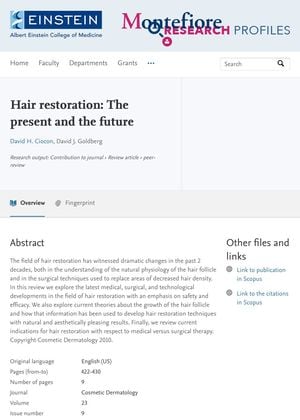Hair Restoration: The Present and the Future
September 2010
in “
Cosmetic Dermatology
”

TLDR Hair restoration has greatly improved over the past 20 years due to advancements in understanding hair growth and new surgical techniques, leading to safer, more effective, and natural-looking results.
In the past 20 years leading up to 2010, the field of hair restoration underwent significant changes, with advancements in understanding the natural physiology of the hair follicle and in the surgical techniques used to replace areas of decreased hair density. The review discussed the latest medical, surgical, and technological developments in hair restoration, emphasizing safety and efficacy. It also explored theories about hair follicle growth and how this information was used to develop hair restoration techniques that yielded natural and aesthetically pleasing results. The review also examined the indications for hair restoration in terms of medical versus surgical therapy.

